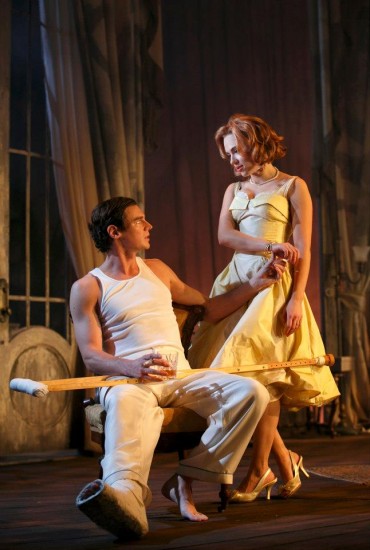
Brick (Benjamin Walker) and Maggie (Scarlett Johansson) smell the odor of mendacity in Broadway revival of CAT ON A HOT TIN ROOF (photo by Joan Marcus)
Richard Rodgers Theatre
226 West 46th St. between Seventh & Eighth Aves.
Through March 30, $27-$132
877-250-2929
www.catonahottinroofbroadway.com
Over the last two years, there has been a plethora of Tennessee Williams revivals on and off Broadway in celebration of the centennial of the Mississippi-born playwright’s birth in 1911, including In Masks Outrageous and Austere, In the Bar of a Tokyo Hotel, Vieux Carré, and A Streetcar Named Desire. The latest is a new Broadway production of Cat on a Hot Tin Roof, which initially debuted on the Great White Way in 1955 and was last seen on Broadway in an all-black version in 2008. The problems with this current revival, directed by Rob Ashford (How to Succeed in Business Without Really Trying), are evident from the very start, as the audience applauds over the opening lines spoken by Scarlett Johansson as Maggie the Cat and continues with Ciarán Hinds’s understated Big Daddy, Debra Monk’s goofy Big Mama, and Benjamin Walker’s barely there Brick. Cat on a Hot Tin Roof demands big, over-the-top performances to hide its relatively basic story line of a family hunkering for a big inheritance when they believe their patriarch to be seriously ill, in addition to a classic Williams subplot of a character having trouble facing his possible homosexuality. It’s not so much that the actors have to deal with the memories of such previous Cat stage and film superstars as Burl Ives, George Grizzard, Charles Durning, and James Earl Jones as Big Daddy, Ben Gazzara, Paul Newman, and Terrence Howard as Brick, and Elizabeth Taylor, Kathleen Turner, and Barbara Bel Geddes as Maggie. Instead, Ashford presents the play as a subdued tale lacking nuance; the audience keeps waiting for electricity and explosions that never happen. Christopher Oram’s set, a large, wide-open bedroom, turns into Grand Central Terminal as characters keep traipsing through, denying Maggie and Brick any privacy as the odor of mendacity increases. This production of Williams’s second Pulitzer Prize winner — Streetcar also garnered the honor — would have been better served in a smaller off-Broadway house than under the glaring lights of the Great White Way.